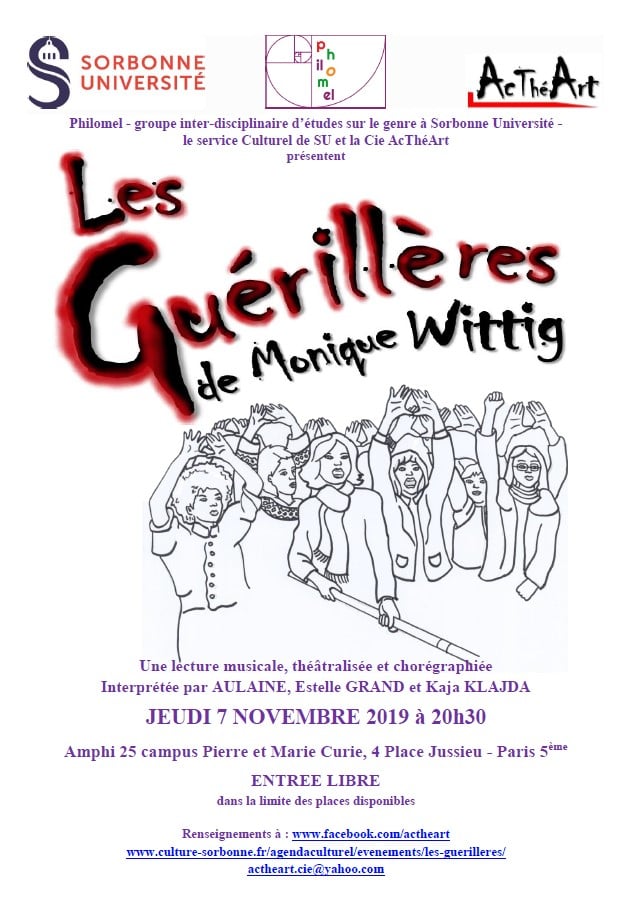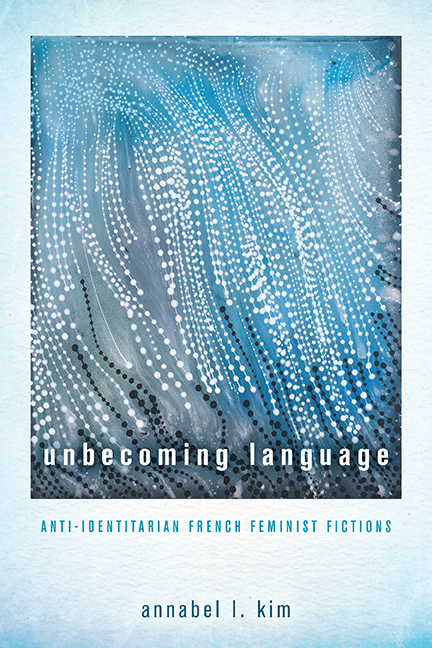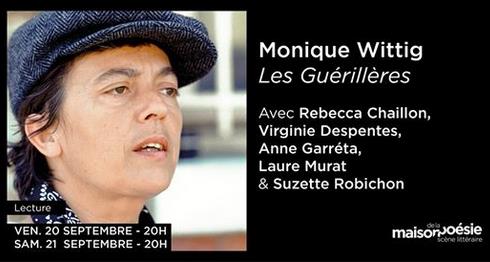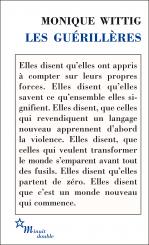Archive
Monique Wittig Celebration and Annual Scholarship Event
In honor of Monique Wittig, the Monique Wittig Writer’s Scholarship will foster innovation in literary forms and the connection between politics and language. It will allow University of Arizona graduate and undergraduate students to allocate more time to their writing.
With readings by
Marianna ColesCurtiss (Scholarship Winner)
Eguono Lucia Edafioka (Runner-up)
Isaac Esposto (Runner-up)
Anne F. Garréta
Elizabeth Lapovsky Kennedy
Marcia Klotz
Laure Murat
Sandra Soto
Sande Zeig
Dominique Bourque (French Translator)
Evening of Readings of L’Opoponax
“My Opoponax is a masterpiece …” wrote Marguerite Duras in 1964 about Monique Wittig’s first book and winner of the Medici Prize. In 2014, the association of friends of Monique Wittig organized at the Maison de la Poésie in Paris, an evening of musical readings with the actress Isabelle Lafon accompanied by Vassili Schémann on drums. Emmanuelle Bernheim, Marie Darrieussecq, Anne F. Garréta, Marie Nimier, Emmanuelle Pireyre, writers who also received the Medici Prize read excerpts to celebrate the 50th anniversary of the awarding of this prize to Monique Wittig.
Evening of Readings from Les Guérillères
“They say they are starting from scratch. They say that a new world is beginning, ”wrote Monique Wittig in Les Guérillères in 1969. Laure Murat, Anne F. Garréta, Rebecca Chaillon, Virginie Despentes read extracts from this text during this reading evening organized at the Maison de la Poésie in Paris by the association of friends of Monique Wittig in 2019. (friend .esdewittig @ gmail.com)
Les Guérillères by Monique Wittig – A reading with dramatised scenes, music and dance.
FREE ENTRY
with limited spaces available
Philomel – An inter-disciplinary group of student from Sorbonne University – The cultural service for Sorbonne University and the players company of the AcTheArt.
Interpreted as theatre, music and dance by AULAINE, Estelle GRAND and Kaja KJAJDA
More information at: www.facebook.com/actheart & http://www.culture-sorbonne.fr/agendaculturel/evenements/les-guerilleres/
The knife without blade and no handle, collective exhibition inspired by Les Guérillères.
The CRAC Alsace, Rhine Center for Contemporary Art, located in Altkirch, France, at 18 rue du Château, presents from October 13, 2019 to January 12, 2020, The knife without blade and no handle, collective exhibition with Meris Angioletti, Tarek Lakhrissi, Candice Lin, Beatriz Santiago Munoz, Liv Schulman, Marnie Slater, Patrick Staff, Lena Vandrey, directed by Elfi Turpin. It brings together artists whose work explores the transformative forces of language in a process of decategorization, disidentification of bodies and relationships, and / or whose anticipatory works are located after Les Guérillères. The exhibition The knife without blade and without handle is part of this reading experience.
Wittig Studies
A place for documentary and publication resources on and around Monique Wittig’s literary and theoretical work
New publication on Monique Wittig
In Unbecoming Language, Annabel L. Kim examines a corpus of French writing against difference. Inaugurated by Nathalie Sarraute and sustained in the work of Monique Wittig and Anne Garréta, this corpus highlights three generations of the twentieth and recent twenty-first centuries and the direct chain of influence between them.
Readings from Les Guérillères
Les Guérillères by Monique Wittig was published 50 years ago. La Maison de la Poésie (Paris 3e) pays tribute to this landmark book in two evening readings, on Friday, September 20 and Saturday, September 21, 2019, with Rebecca Chaillon, Virginia Despentes, Anne Garreta, Laure Murat and Suzette Robichon.
New publication of Les Guérillères in the pocket collection of Éditions Minuit
« Mon but a été de faire que le elles arrive comme un choc pour le lecteur, comme une surprise ; puisqu’elles tient tout le récit il doit s’ensuivre une sorte de désorientation. Le lecteur entre dans un livre et se trouve confronté avec un elles qui n’est pas familier, pas ordinaire et qui est nouveau et héroïque. En tout cas, c’est ce qui m’a guidée et l’espoir que ce elles pourrait situer le lecteur dans un espace au-delà des catégories de sexe pour la durée du livre. C’est peut-être ici que réside l’utopie. » (M. W.)






